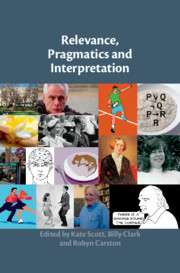Book contents
- Relevance, Pragmatics and Interpretation
- Relevance, Pragmatics and InterpretationEssays in Honour of Deirdre Wilson
- Copyright page
- Contents
- Contributors
- Cover Acknowledgements
- Introduction
- Reflections on the Development of Relevance Theory
- Part I Relevance Theory and Cognitive Communicative Issues
- 1 Scientific Tractability and Relevance Theory
- 2 Language Processing, Relevance and Questions
- 3 Quasi-Factives and Cognitive Efficiency
- 4 Evidential Explicatures and Mismatch Resolution
- 5 Representation and Metarepresentation in Negation
- 6 Pronouns in Free Indirect Discourse
- 7 The Development of Pragmatic Abilities
- Part II Pragmatics and Linguistic Issues
- Part III Figurative Language and Layered Interpretations
- References
- Author Index
- Subject Index
4 - Evidential Explicatures and Mismatch Resolution
from Part I - Relevance Theory and Cognitive Communicative Issues
Published online by Cambridge University Press: 08 July 2019
- Relevance, Pragmatics and Interpretation
- Relevance, Pragmatics and InterpretationEssays in Honour of Deirdre Wilson
- Copyright page
- Contents
- Contributors
- Cover Acknowledgements
- Introduction
- Reflections on the Development of Relevance Theory
- Part I Relevance Theory and Cognitive Communicative Issues
- 1 Scientific Tractability and Relevance Theory
- 2 Language Processing, Relevance and Questions
- 3 Quasi-Factives and Cognitive Efficiency
- 4 Evidential Explicatures and Mismatch Resolution
- 5 Representation and Metarepresentation in Negation
- 6 Pronouns in Free Indirect Discourse
- 7 The Development of Pragmatic Abilities
- Part II Pragmatics and Linguistic Issues
- Part III Figurative Language and Layered Interpretations
- References
- Author Index
- Subject Index
Summary
The chapter addresses the concept of ‘explicature’, a notion which has been central to relevance theory from its inception and which introduced a radically new way of thinking about explicitly communicated meaning and about the semantics–pragmatics distinction. Victoria Escandell-Vidal focuses here on how utterances of particular expressions in Spanish (some occurrences of the verb estar and some uses of 3rd-person imperfective forms) lead to ‘higher-level’ explicatures expressing a speaker’s evidential commitment. She argues that the evidential meaning does not arise from the semantic composition of linguistically encoded content but rather emerges as the optimal solution to a ‘feature mismatch’ between two components of encoded meaning.
Keywords
- Type
- Chapter
- Information
- Relevance, Pragmatics and Interpretation , pp. 66 - 79Publisher: Cambridge University PressPrint publication year: 2019
- 2
- Cited by

